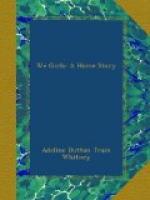“I begin to believe it was easy enough for Grant to say ’all summer,’” said Barbara; “but this is Valley Forge.” The kitchen fire wouldn’t burn, and the thermometer was down to 3 deg. above. Mother was worrying up stairs, we knew, because we would not let her come down until it was warm and her coffee was ready.
That very afternoon Stephen came in from school with a word for the hour.
“The Stilkings are going to move right off to New Jersey,” said he. “Jim Stilking told me so. The doctor says his father can’t stay here.”
“Arctura Fish won’t go,” said Rosamond, instantly.
“Arctura Fish is as neat as a pin, and as smart as a steel trap,” said Barbara, regardless of elegance; “and—since nobody else will ever dare to give in—I believe Arctura Fish is the very next thing, now, for us!”
“It isn’t giving in; it is going on,” said Mrs. Holabird.
It certainly was not going back.
“We have got through ploughing-time, and now comes seed-time, and then harvest,” said Barbara. “We shall raise, upon a bit of renovated earth, the first millennial specimen,—see if we don’t!—of what was supposed to be an extinct flora,—the Domestica antediluviana.”
Arctura Fish came to us.
If you once get a new dress, or a new dictionary, or a new convenience of any kind, did you never notice that you immediately have occasions which prove that you couldn’t have lived another minute without it? We could not have spared Arctura a single day, after that, all winter. Mother gave up, and was ill for a fortnight. Stephen twisted his foot skating, and was laid up with a sprained ankle.
And then, in February, grandfather was taken with that last fatal attack, and some of us had to be with Aunt Roderick nearly all the time during the three weeks that he lived.
When they came to look through the papers there was no will found, of any kind; neither was that deed of gift.
Aunt Trixie was the only one out of the family who knew anything about it. She had been the “family bosom,” Barbara said, ever since she cuddled us up in our baby blankets, and told us “this little pig, and that little pig,” while she warmed our toes.
“Don’t tell me!” said Aunt Trixie. Aunt Trixie never liked the Roderick Holabirds.
We tried not to think about it, but it was not comfortable. It was, indeed, a very serious anxiety and trouble that began, in consequence, to force itself upon us.
After the bright, gay nights had come weary, vexing days. And the worst was a vague shadow of family distrust and annoyance. Nobody thought any real harm, nobody disbelieved or suspected; but there it was. We could not think how such a declared determination and act of Grandfather Holabird should have come to nothing. Uncle and Aunt Roderick “could not see what we could expect about it; there was nothing to show; and there were John and John’s children; it was not for any one or two to settle.”




